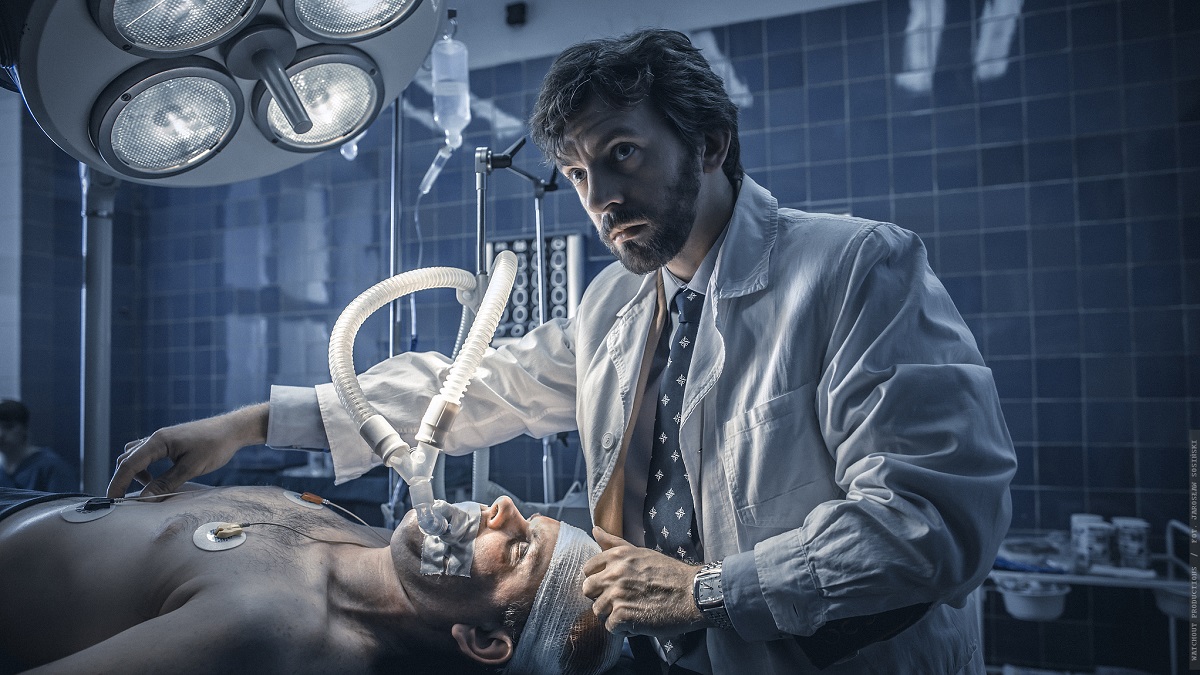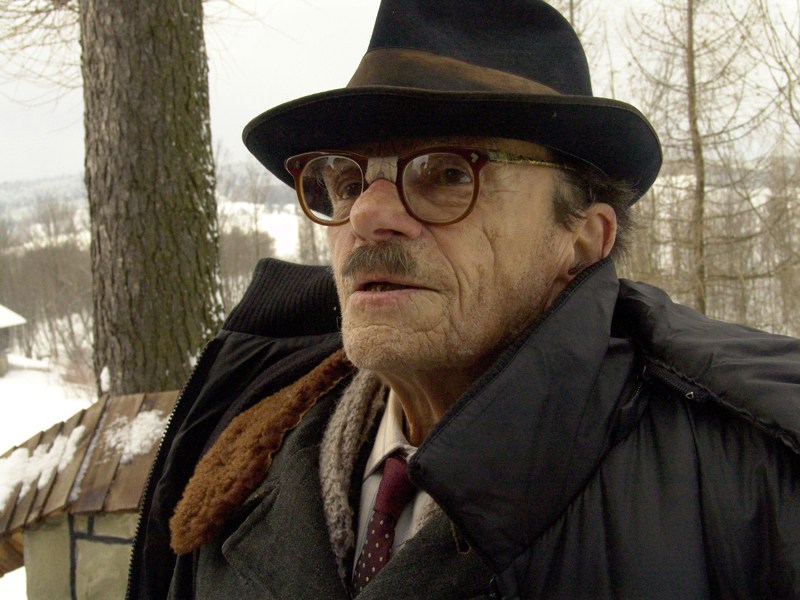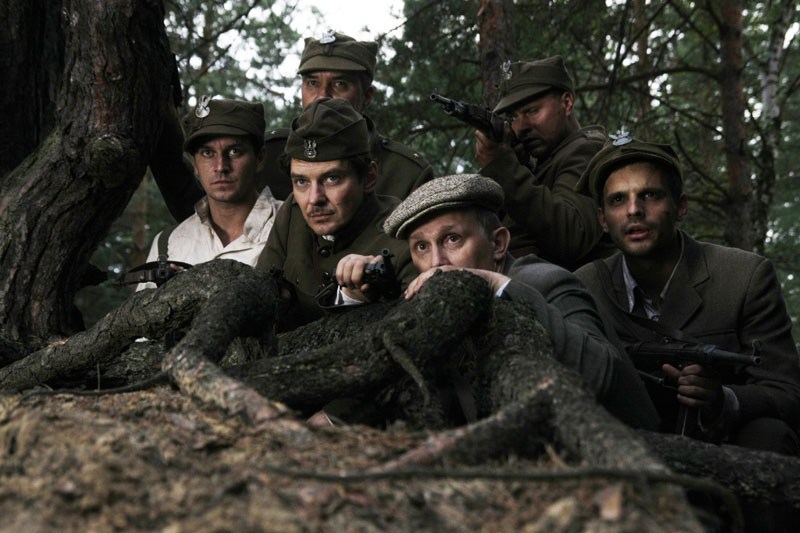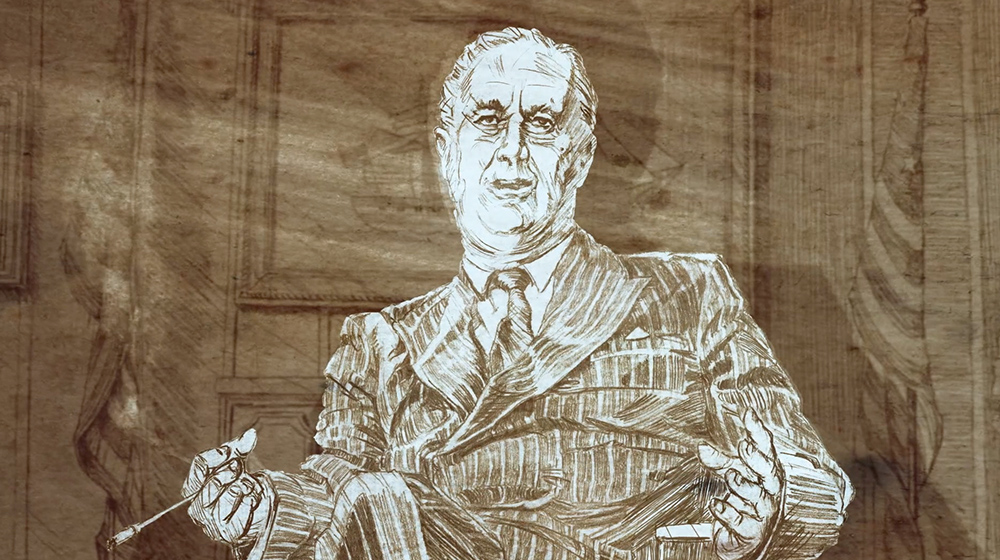What sparked this trend? The answer is quite simple – it’s all thanks to Łukasz Palkowski’s 2014 film Gods. The story of Zbigniew Religa (scripted by Krzysztof Rak), a cardiac surgeon who performed the first successful heart transplant in Poland in 1987, was proof that biographical films need not show uncomplicated praise. Heroes can be human – flaws, failures and weakness can all be part of the story. It turned out audiences were waiting for such a complicated hero. In 2014, Gods not only won the Gdynia Film Festival, garnering five awards, it also attracted over two million viewers in theatres.
 Piotr Głowacki in Gods, dir. Łukasz Palkowski, photo by Jarosław Sosiński
Piotr Głowacki in Gods, dir. Łukasz Palkowski, photo by Jarosław SosińskiAn interesting biography is not only a sure-fire hit with screenwriters, but also a product that is easy to sell in the media. One need only look at the success of recent biopics to see that stories about the lives of well-known people are box-office gold. While the number of viewers attracted by Gods remains the high standard, at least a few recent biopics have crossed the magical barrier of a million spectators. In 2012, Leszek Dawid’s You are God, a ‘biography’ of the rap ensemble Paktofonika, drew nearly 1.5 million viewers to theatres. In 2014, Władysław Pasikowski’s Jack Strong was seen by 1.2 million people, while Wałęsa: Man of Hope by Andrzej Wajda attracted almost a million.
A well-tailored biography is not the only a chance for success – an interesting biography can also be the basis of a strong individual statement.
Jan P. Matuszyński’s The Last Family, for example, tells the story of Polish artist Zdzisław Beksiński and his son Tomek, but is much more than just a collection of images from their lives. Matuszyński is more interested in the difficult, painful, demanding and disappointing relationship between father and son than he is with the details of Zdzisław’s painting or Tomek’s passion for music. The film tells a story of taming death and the tragedy of life, rather than simply relating the triumphs and inspirations of the painter.
 Still from the film My Nikifor, directed by Krzysztof Krauze. Pictured: Krystyna Feldman as Nikifor Krynicki, photo: Maciej Racławski/Digital/East News
Still from the film My Nikifor, directed by Krzysztof Krauze. Pictured: Krystyna Feldman as Nikifor Krynicki, photo: Maciej Racławski/Digital/East NewsThe Last Family is not the only case of a biography of a well-known artist serving as the catalyst for a film that reveals as much about the director and scriptwriter as it does about the heroes themselves. It is enough to mention Papusza by Krzysztof Krauze and Joanna Kos-Krauze, a biographical film about Roma poet Bronisława Wajs. On the surface, the film is a classic story of life and creativity – beginning in the poet’s early years and leading the viewer through the next stages of her life. Papusza is much more, however, as it also speaks about the need for freedom and a world that has vanished forever. This beautiful black and white film contemplates similar questions as My Nikifor, also from Krauze and Kos-Krauze. The similarities stem not only from the parallels between Nikifor and Papusza, but also from the fact that their stories are filtered through the distinct sensitivities of Krzysztof Krauze and Joanna Kos-Krauze.
And while Gods, Papusza and The Last Family show that biopics can offer deep stories through the lives of lesser known figures, there is still no shortage of films produced to promote the popularity of famous figures.
Several years ago, Polish TVN produced a series of films that did just that. The films were devoted to the stories of figures well-known in Polish media and among their audience. Shortly thereafter, they made biographical films about boxer Przemysław Saleta (Boxer), artic explore and double amputee Jan Mela (My Pole) and volleyball player Agata Mróz (Nad życie). Pastel, polite and sentimental, these films told audiences stories they already knew – and made money doing so. Although the productions left much to be desired artistically, the films found an audience. Nad życie (editor’s translation: Larger than Life) attracted nearly 370,000viewers (ranked 6th in Poland for 2012) and My Pole drew 385,000 (7th for 2013).
 The Story of Swarm, directed by Jerzy Zalewski, photo: promotional material Kino Świat
The Story of Swarm, directed by Jerzy Zalewski, photo: promotional material Kino ŚwiatAlthough commercial cynicism is certainly not a good motivation for screenwriters, too much ideological or sentimental investment in the story of the figure you want to share is not much better. Such attachment can be seen in Jerzy Zalewski’s The Story of Swarm and Dariusz Regucki’s Karolina. Although the filmmakers here have certainly given their hearts to the projects, both lack a certain professional distance. As a result, instead of cinematic tributes, caricatures emerge that do their heroes more harm than good.
 Still from Karski and the Lords of Humanity by Sławomir Grünberg, photo: promotional materials
Still from Karski and the Lords of Humanity by Sławomir Grünberg, photo: promotional materials It doesn’t look like the biography trend will be ending anytime soon – not only in feature films but also in books (nonfiction literature is an increasingly important part of it) and documentaries. In recent years, a number of biographical documentaries have found their way to the big screen. Apartment about John Paul II, Karski and the Lords of Humanity about Jan Karski, A Dream of Warsaw about Czesław Niemen and Pilecki about the heroic Polish officer Witold Pilecki were met with bigger audiences than many feature films.
Viewership numbers show that audiences like stories about people they know from the pages of textbooks or newspapers columns. We can only hope that the quality of these films will match their quantity and that future biopics will continue to offer complex and sensitive portraits in the style of Gods, The Art of Love and The Last Family.
Originally written in Polish by Bartosz Staszczyszyn, 02 Feb 2017; translated by AGA, 23 Jun 2017